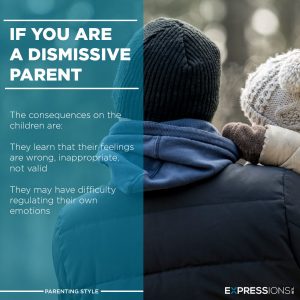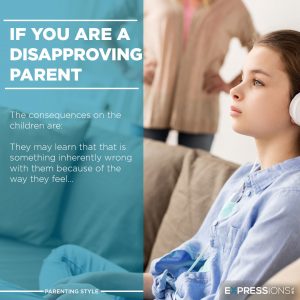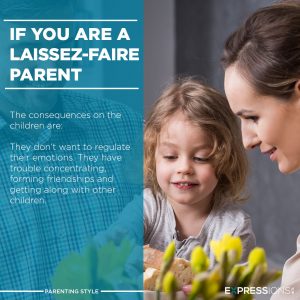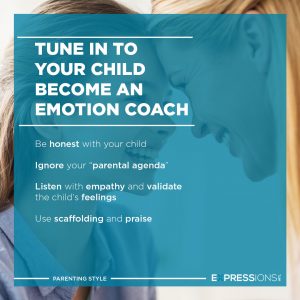ANOTHER APPROACH
The dismissive parents

They don’t
● Feel certain about how to address the child’s emotions
● Problem-solve with the child
● Focus much on the meaning of emotions; more interested in how to get over them
● Have great self-awareness or social awareness
● Like to focus on negative emotions
They do
● Tend to avoid or dismiss emotions; minimizing the child’s feelings
● Feel worried, uncomfortable, fearful, irritated, or overwhelmed by the child’s emotions
● Believe that focusing on negative emotions will make things worse
● Ignore the child’s feelings; treat them as unimportant
● Believe negative emotions are reflected badly on them
Consequences on the children
● They learn that their feelings are wrong, inappropriate, not valid
● They may learn that there is something inherently wrong with them because of the way they feel
● They may have difficulty regulating their own emotions
The disapproving parents.

They do
● Believe expression of negative emotions should be time-limited
● Believe the child uses negative emotions to manipulate
● Believe emotions make people weak; children must be emotionally tough for survival
● Believe negative emotions are unproductive; a waste of time
● Judge and criticize the child’s emotional expression
● Reprimands or punish the child for emotional expression, whether the child is misbehaving or not
● Show many of the dismissing parent’s behavior, but in a more negative way
Consequences on the children
● Same as the dismissing style
The laissez-faire parents

They don’t
● Teach problem-solving methods to the child
● Set limits
● Help with problems
● Teach the child about emotions
● Offer much guidance on behavior
They do
● Believe there is little you can do about negative emotions
● Manage negative emotions by encouraging the child to release them and the work is done
● Offer comfort to the child experiencing negative feelings
● Easily accept all emotional expressions from the child
Consequences on the children
They don’t want to regulate their emotions. They have trouble concentrating, forming friendships and getting along
with other children.
Because they are accustomed to getting most of what they want from their parent, they tend to be the main
decision makers in terms how they are raised. They become demanding and have little respect for adult authority.
The emotion-coaching parents

They don’t
● Make light of the child’s negative feelings
● Feel they have to fix every problem for the child
They are not
● Anxious about the child’s emotional expression; they know what needs to be done
They do
● Value the child’s negative emotions as an opportunity for growth
● Tolerate spending time with a sad, angry or fearful child
● See the world of negative emotions as important for effective parenting
● Respect the child’s emotions
They use emotional moments as a time to:
● Empathize with soothing words and affection
● Help the child label the emotion he or she is feeling
● Listen to the child
● Offer guidance on regulating emotions
● Teach problem-solving skills
● Set limits and teach acceptable expressions of emotions
Consequences on the children
● They learn to:
o Trust their feelings
o Regulate their own emotions
o Solve problems
● They have high self-esteem, learn well, get along well with others.